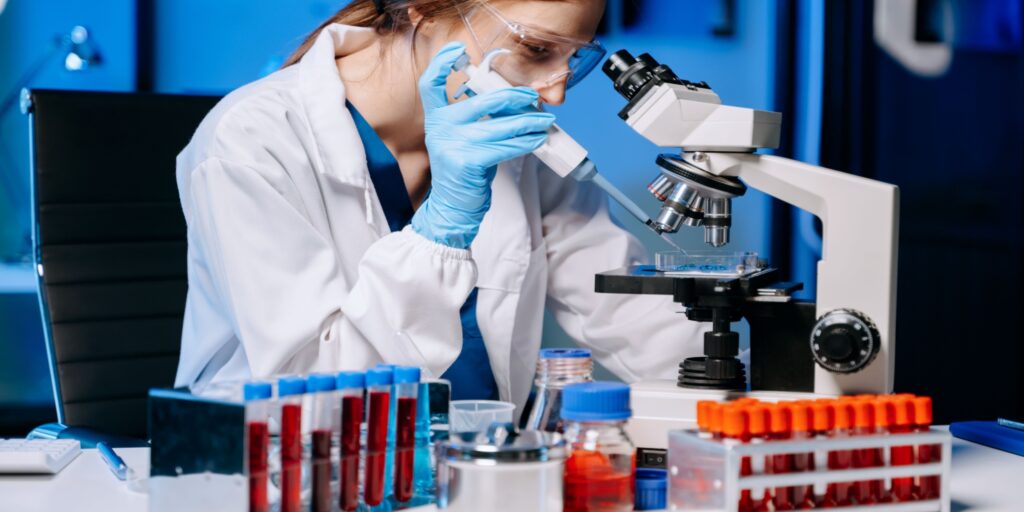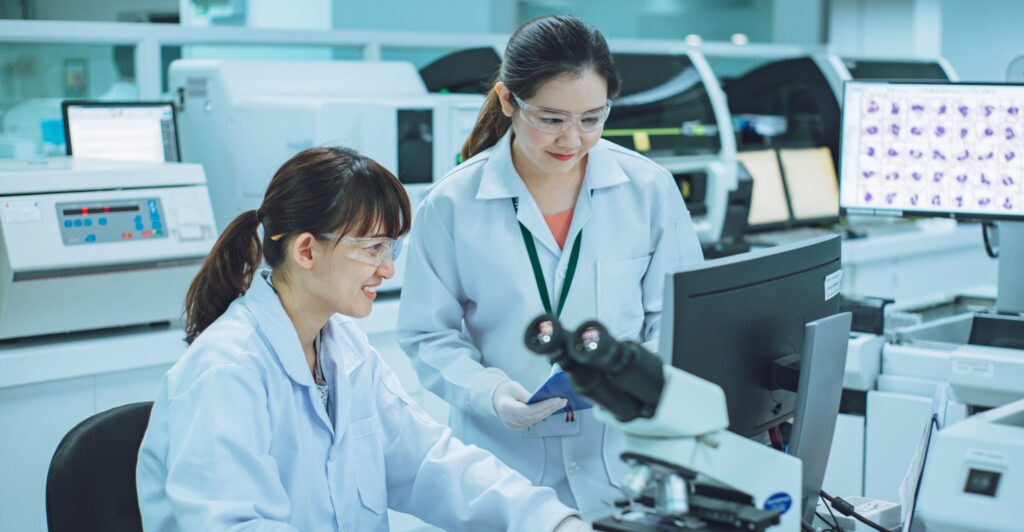No products in the basket.
Have you ever wondered what goes on behind the scenes in a medical laboratory? Lab technicians play a crucial role in healthcare, yet their work often remains a mystery to many. Therefore, understanding their responsibilities and contributions can provide insight into the healthcare system’s backbone. In this blog, we will explore what lab technicians do, their required skills, their salaries, and their impact on patient care.

The Role of Lab Technicians
Lab technicians are essential in the medical field. They perform a variety of tasks that aid in patient diagnosis and treatment. They work in laboratories, using sophisticated equipment to conduct tests on samples such as blood, urine, and tissue. As a result, they provide vital data that doctors rely on to make informed medical decisions.
Key Responsibilities:
- Sample Collection and Preparation: Lab technicians collect samples from patients, ensuring they are labelled and stored correctly. Therefore, this step is important to prevent contamination and provide accurate results.
- Conducting Tests: They perform a wide range of tests, from simple blood counts to more complex procedures like genetic testing. Hence, their work requires precision and attention to detail.
- Data Analysis: After conducting tests, lab technicians analyse the results and record the findings. So, they must be able to interpret data accurately to assist doctors in diagnosing conditions.
- Maintaining Equipment: Lab technicians are responsible for keeping the equipment in top condition. Thus, regular maintenance and calibration of lab equipment are necessary to provide accurate test results.
- Quality Control: They implement quality control measures to confirm that lab results are reliable and meet industry standards.
Skills Required for Lab Technicians
To excel in their roles, lab technicians must possess a specific set of skills. These skills not only improve their efficiency but also ensure the safety and accuracy of their work. So, here are some of these skills:
- Attention to Detail: Precision is important in lab work. Even minor errors can lead to incorrect diagnoses. So, lab technicians must be careful in their work.
- Technical Proficiency: Lab technicians must be able to operate complex machinery and troubleshoot any issues that arise. Hence, familiarity with laboratory equipment and software is essential.
- Analytical Skills: The ability to analyse and interpret data is crucial. Therefore, lab technicians must understand the implications of test results and how they relate to patient health.
- Communication Skills: Clear communication ensures that doctors have the information needed to make decisions. So, they must effectively communicate their findings to healthcare professionals.
- Time Management: Lab technicians often work with tight deadlines. Thus, they must manage their time efficiently to process samples and deliver results promptly.

The Impact of Lab Technicians on Healthcare
Lab technicians significantly impact healthcare by providing the data necessary for diagnosis and treatment. As a result, their work supports doctors and specialists, allowing them to make accurate and timely decisions regarding patient care.
Contributions to Healthcare:
- Early Detection of Diseases: By analysing samples, lab technicians help detect diseases early, allowing for prompt treatment and better patient outcomes.
- Monitoring Treatment Progress: Regular testing helps monitor how well a patient is responding to treatment, enabling adjustments as needed.
- Research and Development: Lab technicians often participate in research, contributing to medical advancements and the development of new treatments.
- Public Health: They play a role in tracking disease outbreaks and monitoring public health trends, providing data that informs public health policies.
Job Positions and Salaries for Lab Technicians in the UK
Salaries for lab technicians in the UK vary based on factors such as experience, location, and the specific industry. Here’s a breakdown of salary expectations:
- Starting Salaries: Entry-level lab technicians can expect to earn between £17,500 and £22,000 per year. These positions often require basic qualifications and may offer opportunities for further training and development.
- Mid-Level Salaries: With some experience, lab technicians can earn between £22,000 and £28,000 annually. This level typically involves more complex tasks and responsibilities.
- Senior Positions: Experienced lab technicians in senior or supervisory roles can earn between £30,000 and £40,000 per year. Thus, these positions often require advanced skills and may involve managing a team or overseeing significant projects.
- Top-Paying Locations: Salaries can also vary significantly by location. For instance, lab technicians in Tenbury Wells can earn around £45,000, while those in Peterhead may earn £44,940. Moreover, other locations, like Norwich and Gloucester, offer salaries in the range of £30,000 to £35,000.
Challenges Faced by Lab Technicians
Despite their crucial role, lab technicians face several challenges in their work. Recognising these challenges can lead to better support and resources for these professionals.
Common Challenges:
- Workload and Stress: High demand for testing can lead to heavy workloads and stress. Lab technicians must balance efficiency with accuracy under pressure.
- Exposure to Hazards: Working with biological samples and chemicals poses health risks. Therefore, strict safety protocols are essential to protect lab technicians.
- Keeping Up with Technology: The rapid advancement of technology requires lab technicians to continually update their skills and knowledge.
- Limited Recognition: Despite their importance, lab technicians often receive little recognition for their contributions. Therefore, increasing awareness of their role can lead to greater appreciation and support.
Conclusion
In summary, lab technicians are vital to the healthcare system, providing essential data that aids in diagnosis and treatment. Their work requires a unique set of skills and involves overcoming various challenges. So, by understanding what lab technicians do, we can appreciate their contributions and the impact they have on patient care. As healthcare continues to evolve, the role of lab technicians will remain indispensable, supporting medical professionals and enhancing patient outcomes.




